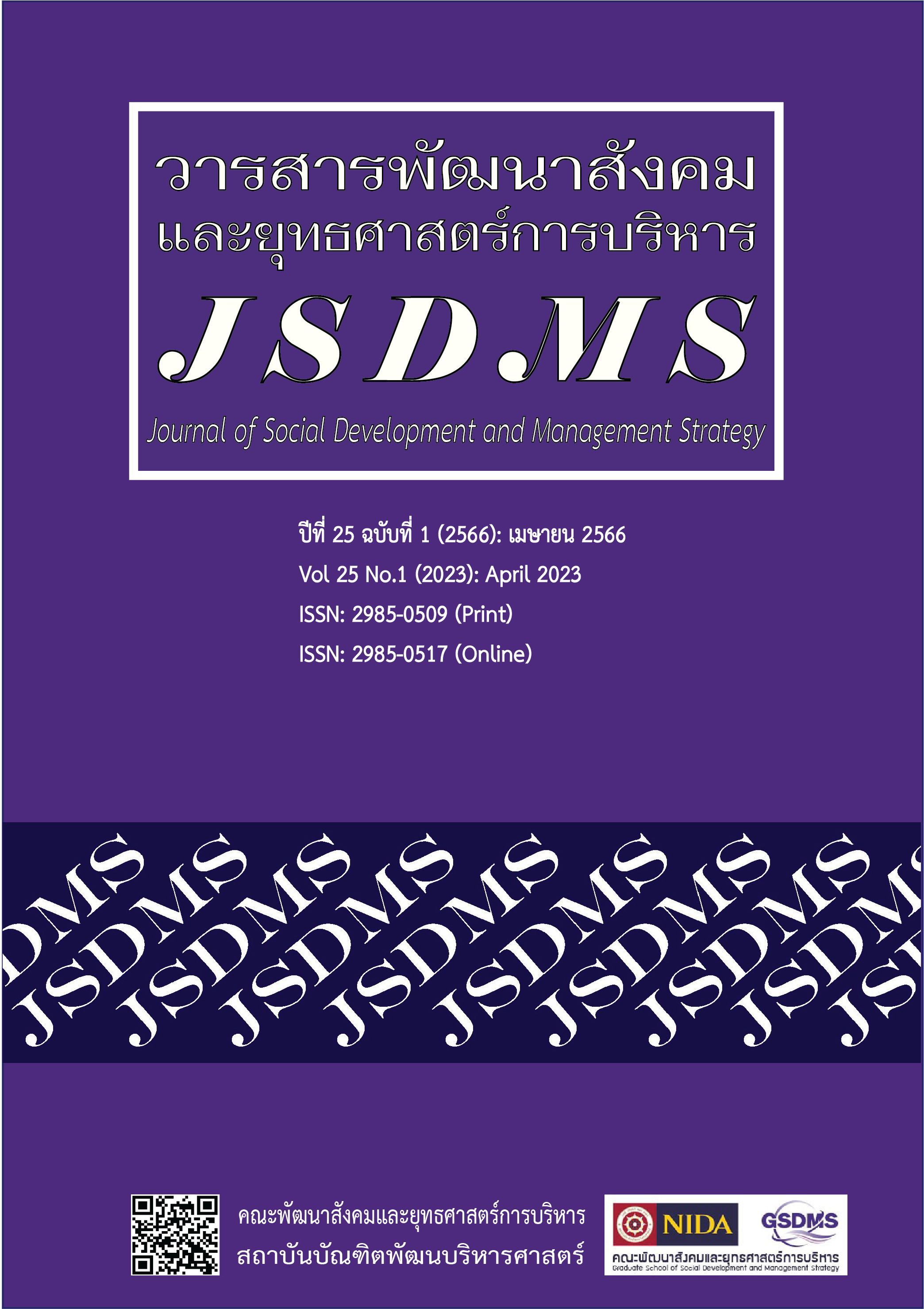Semantic Study of Green City with Actor Network Theory in Thai-Isan Areas.
Main Article Content
Abstract
The purpose of this qualitative research was to investigate the explanation of the green city in Thai-Isan areas. Actor Network Theory (ANT), a sociological concept, has considered roles and connections as a theoretical framework for this study. The target group consists of 20 representatives from the government (10 persons) and population sectors (10 persons). Data was collected using a semi-structured interview method between 2020 - 2022. This research focused on the cities with the largest green space sizes in northeast Thailand, namely Nakhon Khon Kaen municipality and Nakhon Udon Thani municipality. The findings revealed that citizens and government agencies have different perspectives on green urbanism. Government agencies value green cities for reducing air pollution, while citizens prioritize green cities for livelihoods over beautiful areas.
Article Details

This work is licensed under a Creative Commons Attribution-NonCommercial-NoDerivatives 4.0 International License.
References
Benjamas Chotthong, Kamolrat Pohti, Wilawan Noipaa, Chaloemrat Disayapanya, Ratchaporn Sangkarohtai, & Puangpaka Kaogratohk. (2015). Deciphering a livable city [In Thai]. Bangkok: Saengsawang Ganpim Printing.
Brilhante, O., & Klaas, J. (2018). Green city concept and a method to measure green city performance over time applied to fifty cities globally: Influence of GDP, population size and energy efficiency. Sustainability, 10(6), 2031.
Callon, Michel. (1986). The sociology of an actor-network: The case of the electric vehicle. In Callon, M., Law, J., Rip, A. (Eds.), Mapping the dynamics of science and technology (pp. 19-34). Palgrave Macmillan: London.
Carroll, N., Richardson, I., & Whelan, E. (2012). Service science: An actor-network theory approach. International Journal of Actor-Network Theory and Technological Innovation (IJANTTI), 4(3), 51-69.
Cheshmehzangi, A., & Griffiths, C. J. (2014). Development of green infrastructure for the city: A holistic vision towards sustainable urbanism. Journal of Architecture and Environment, 2(2), 13-20.
Chou, T. L. (2012). ANT analysis on the river management of urban Taiwan: a case study of Keelung river in Taipei basin. Advances in Applied Sociology, 2(03), 203.
Department of Environmental Quality Promotion. (2019). Assessment Guide for Environmentally Sustainable Cities [In Thai]. Bangkok: World Expert Company Limited.
Economist Intelligence Unit. (2011). Asian green city index: Assessing the environmental performance of Asia’s major cities. Germany: Siemens Franziska Consolati.
Jakkrit Sangkhamanee. (2016). We have never been modern in science and non-science: non-objectivity, non-humanism, and Actor-Network Theory of Bruno Latour [In Thai]. In Chantanee Charoensri (Eds.), Science and non-science: come outside and go inside
[In Thai]. (pp. 142-178). Nonthaburi: Paragraph publishing.
Lal, R. (2020). Home gardening and urban agriculture for advancing food and nutritional security in response to the COVID-19 pandemic. Food Security, 12(4), 871-875. doi:10.1007/s12571-020-01058-3
Latour, B. (2005). Reassembling the Social: An introduction to Actor-Network-Theory. New York: Oxford University Press.
Nardsiri Komonpan. (2014). City farming: Includes patterns, techniques, and tips for growing vegetables in the city [In Thai]. Nonthaburi: Parbpim Printing.
Newman, P. (2010). Green urbanism and its application to Singapore. Environment and urbanization Asia, 1(2), 149-170.
Setiowati, R., Mizuno, K., Hasibuan, H. S., & Koestoer, R. H. (2022). Actor-network theory approach for urban green spaces planning: Study in Jakarta Capital City, Indonesia. Kasetsart Journal of Social Sciences, 43(4), 1075-1084. doi:10.34044/j.kjss.2022.43.4.33
Sombat Kusumavalee. (2000). Actor-network theory: Modest sociology and the new approach to study power relations [In Thai]. NIDA Development Journal, 40(1), 75-119.
Steffen Lehmann. (2010). Green urbanism: Formulating a series of holistic principles. Surveys and Perspectives Integrating Environment and Society, 3(2), 1-16.
TÎRLĂ, M. L., Manea, G., Vijulie, I., Matei, E., & Cocos, O. (2014). Green cities–Urban planning models of the future. In Cities in the globalizing world and Turkey: A theoretical and empirical perspective (pp. 462-479). University Press: Sofia, Bulgaria.
Wanwilai Wayalun. (2014). Green city index for urban environmental planning of Thai cities in lower Northern Region (Unpublished master’s thesis). Silpakorn University, Bangkok.
Zain, A. F., Pribadi, D. O., & Indraprahasta, G. S. (2022). Revisiting the Green City concept in the tropical and Global South cities context: The case of Indonesia. Frontiers in Environmental Science, 10, 45.


